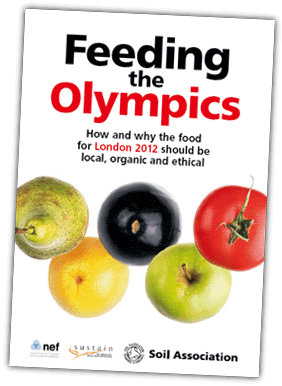Feeding The Olympics: Why food for the London 2012 Games should be local, seasonal and organic
 This 2007 report marked the first step in a five-year campaign to ensure that the food associated with the London 2012 Games matches the values enshrined within the Olympic Charter, and the promises made in the London 2012 bid for the “most sustainable games ever”.
This 2007 report marked the first step in a five-year campaign to ensure that the food associated with the London 2012 Games matches the values enshrined within the Olympic Charter, and the promises made in the London 2012 bid for the “most sustainable games ever”.
Specifically, the London 2012 Olympic and Paralympic Games bid promised “to support consumption of local, seasonal and organic produce”. With this report, we hoped to strengthen the resolve to meet these promises by providing both a rationale and a practical plan of action for making the London 2012 Olympic Games the first Games to serve sustainable food.
Because of their iconic nature, the Olympic and Paralympic Games are an opportunity to create changes in culture and policy – and the London bid was successful precisely because it was both visionary and ambitious. The Feeding the Olympics report sets out how those ambitions and promises must be met. With the eyes of the world upon London, it is imperative that the 2012 Olympic Games uphold the promises of sustainability and the promotion of healthy living in all aspects of the Games – throughout the construction period, during Games time itself, and in the legacy that is left behind.
Provision of food is a particularly important factor in sustainability. The environmental and social effects of providing about 1.3 million meals to construction workers and 14 million attendees during the Games can be either negative or positive, but will be very significant in either case. The longer-term impact of a sustainable approach to food provision for the communities, created for the legacy stage, will be even greater. This report therefore focuses on three key aspects of food for the London 2012 Olympic and Paralympic Games:
- provision of food during the Games time itself
- food for construction workers
- the legacy of the Games.
The report was written by environmental consultant and climate change specialist Robin Webster, commissioned by a partnership of organisations - New Economics Foundation, Sustain and the Soil Association, funded by a grant from Triodos Bank.
Since publication of this report, Sustain was involved extensively in the London 2012 Food Advisory Group, from 2009 to 2012, helping to create and support implementation of the London 2012 Food Vision, setting the ethical and sustainability standards for the 14 million meals to be served at the London 2012 Olympic and Paralympic Games. This work also inspired the launch of the Food Legacy campaign to help more caterers and food suppliers achieve the ambitions of the London 2012 Food Vision and influence the creation of Sustain's successful Sustainable Fish City campaign. The same principles are also applied in the Good Food for Our Money campaignand the new Campaign for Better Hospital Food which is calling for mandatory health and sustainability standards for all hospital food.
Report contents
Introduction: Food and the Olympics, the opportunity of a lifetime
Summary
London 2012
- A green games
- A sustainable food games
- Sustainable food pledges within the London 2012 bid
- Feeding the Games: The challenge
Sustainable food - the time is now
- Food and climate change
- Sustainable fish
No medals for 'business as usual'
- Health
- Environment
- Society
Going for Gold - towards a more sustainable food Games
- Construction phase
- Games time
- The legacy
- Training and education
- Making space for food
Can Coca-Cola and McDonald's really sponsor 'the most sustainable Games ever'?
Steps up to the winners' podium
- The vision
- The sustainable food 12 step programme
Appendix
References

Feeding The Olympics: Why food for the London 2012 Games should be local, seasonal and organic
36pp - 2007 | 475Kb
Published Sunday 30 September 2007
Olympic Food: Sustain ran a five-year programme of work to win healthy and sustainable food standards for the London 2012 Olympic and Paralympic Games.